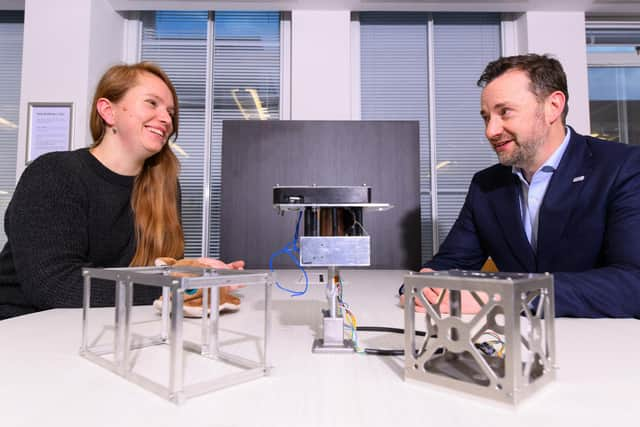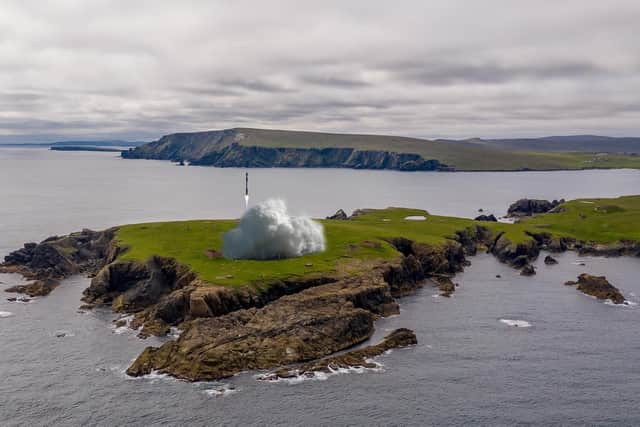Space Scotland: Satellites and Scottish rocket launch sites 'essential' to combat climate change, says UK Space Agency chief
Space technology is “essential” to combat climate change, the head of the UK Space Agency has insisted on a visit to Scotland – but stressed environmental mitigations are needed.
Chief executive Paul Bate said data collected from satellites sent up into space, from locations such as the UK’s first spaceport in northern Scotland, was needed to measure climate change-related data such as sea temperature and wind speeds. It comes as scientists warned increasing commercialisation of space could have an adverse effect on the environment.
Advertisement
Hide AdAdvertisement
Hide AdBate confirmed the first, non-orbital launches would take place at the SaxaVord Spaceport in Unst, Shetland, later this year. Pressure around the site from conservationists has seen operators alter their plans to pause launches during the bird migration season. Orbital launches are scheduled to begin in a second spaceport, located on the A’Mhoine peninsula northwest of Tongue village, in Sutherland next year.


The SaxaVord spaceport will be the first of its kind in Britain – and Europe. Other sites in Scotland – in the Western Isles; at Machrihanish, near Campbeltown, in Argyll; and another at Prestwick, near Glasgow – are also being considered as launch centres.
“We're not going to solve the problem of climate emergency without satellites,” said Bate. “Over half of all the data that is used to build climate change models relies on satellite data.
"With things like deforestation, you can fly a drone or a plane over the Amazon and it will look like the trees are all intact, because the illegal loggers keep the tree canopy intact. But if you use a satellite radar system, you can look straight through that canopy and see just how many trees have been removed. So we need space to keep and protect the environment.”
Last year, University of Edinburgh scientist Andy Lawrence was one of five academics to publish a paper calling for the environmental protection of orbital space.


In the paper, entitled The Case for Space Environmentalism, the academics said there was an “urgent need” for orbital space to be considered as part of the human environment – and insisted it was “worthy” of both new and existing environmental protections. They pointed to the environmental effect of launches, saying that while the impact is currently small, the “huge number” of launches required to build and maintain satellites will increase pollution “by a large factor”.
Other potential problems raised in the paper included risk to property and life from debris falling from space, as well as changes to the night sky, which could have an effect on migrating birds.
Bate said it was essential to balance growing the space industry with environmental impacts.
Advertisement
Hide AdAdvertisement
Hide AdHe said: “At the same time, the UK is taking very seriously the regulations of giving people licences only when they can demonstrate that their satellite technology is as environmentally sustainable as it can be. And that's everything from migrating bird seasons to using more sustainable fuels; having a very clear plan, not just about how you get up into space and recognising the carbon footprint of that, but also making sure that we don't pollute the space environment itself.”
Bate added: "There's only so much metal that we can have in space and right now the amount of satellites and debris in orbit is growing at twice the speed as the amount of plastics in the ocean. So we want to take a pre-leading role in in managing and keeping safe for future generations."
While Bate admitted he could not rule out sending a human into space in the future, he said the focus in coming years would be on satellites.
"When you start talking about astronauts, it captures the imagination,” he said, pointing to the UK’s participation in Nasa’s Artemis programme, which will land the first woman and first person of colour on the Moon. “Never say never. But the aim is very focused on small satellite launches. That's the growing launch market that we see, that's the opportunity for the UK to really shine, to be the main provider of small satellite launches across Europe.
"I think it's always better to focus on the job in hand and get that right. Who knows where we'll go at some point in the future. But it's a very, very different system to launch a human into orbit given the scale of the rocket.”
The Artemis rocket being built by Nasa is more than 100m in length. In contrast, the Orbex Prime rockets that will take off from Space Hub Sutherland will be just 19m high and consist of only two stages. ABL rockets that will lift off from SaxaVord will be only slightly bigger.
Scotland is regarded as leading the way in the British space industry, partly due to strong geographical locations for situating spaceports, which allow monitoring satellites to be sent out over open seas and over the poles, enabling “sun-synchronous orbits”.
Almost one in five space-related jobs – totalling 8,000 – in the UK is in Scotland. A new Scottish Space Strategy launched last year by SpaceScotland aims to create 20,000 jobs in the sector by 2030 – through developing a network of satellite launch sites, green technologies, and data analysis and research. Glasgow manufactures more satellites than anywhere else in Europe, while other manufacturing facilities for satellite components are already in place.
"Scotland is an absolute powerhouse of the space sector in the UK,” said Bate.
Comments
Want to join the conversation? Please or to comment on this article.
